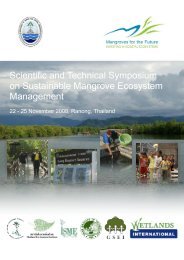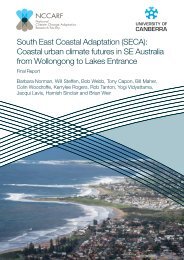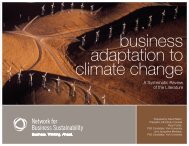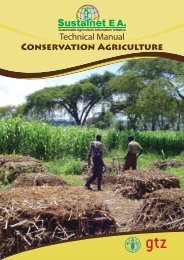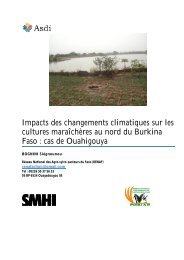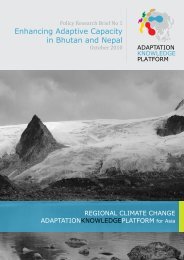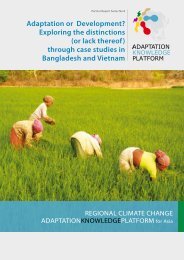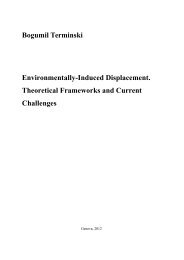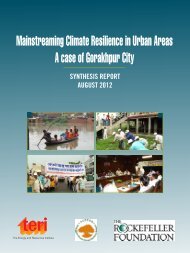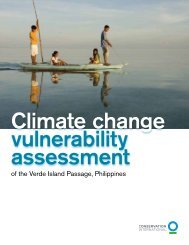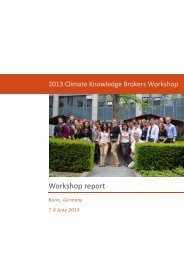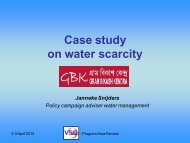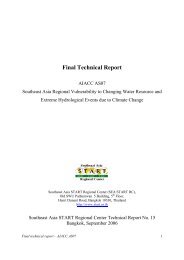In both the developed <strong>and</strong> developing world, <strong>urban</strong> planners have for many yearstreated agricultural activities as something at least to be regulated <strong>and</strong> in some casesto be positively discouraged in <strong>urban</strong> <strong>and</strong> even sub<strong>urban</strong> areas. As Morgan (2009: p.344) notes:Paradoxically, <strong>urban</strong> planners in Africa have been part of the problem of <strong>food</strong>in<strong>security</strong> because, until recently, they saw it as their professional duty to rid thecity of <strong>urban</strong> agriculture. The rationale for ridding the city of <strong>urban</strong> farmers <strong>and</strong>street <strong>food</strong> vendors varied from country to country, but it was often animated by acombination of sound concerns about public health <strong>and</strong> less than sound notionsof <strong>urban</strong> modernity.We might note also that in many cities in the developed world, <strong>urban</strong> agriculture issometimes seen as incompatible with contemporary visions of the desirable city,although this is now changing in many contemporary debates about the nature ofsustainable, liveable <strong>and</strong> resilient cities in the face of global challenges such as peakoil <strong>and</strong> <strong>climate</strong> <strong>change</strong>.Morgan (2009: p. 341) suggests therefore that:...for the foreseeable future, <strong>food</strong> planning looks set to become an important <strong>and</strong>legitimate part of the planning agenda in developed <strong>and</strong> developing countriesalike.However, as Howe (2003: p. 255) notes, ‘[scholarly] research has tended to bypass orperhaps even ignore <strong>food</strong> that is grown within <strong>urban</strong> areas <strong>and</strong> the l<strong>and</strong>-use policyimplications of such activities.’ In his survey of metropolitan planning authorities in theUK, Howe found that almost half of the responding planners described their awarenessof issues of <strong>food</strong> production in <strong>urban</strong> areas to be low, while the ways in which theseissues were incorporated into l<strong>and</strong> use plans focussed typically on the environmental,rather than the social or economic aspects, of <strong>urban</strong> agriculture. This suggests thewide range of activities that exist under the broad heading of <strong>urban</strong> agriculture tend tobe seen, by the planning system at least, as a somewhat marginal activity rather thansitting ‘...right at the heart of debates concerning the sustainable city <strong>and</strong> those relatedto <strong>urban</strong> containment versus expansionism’ (Howe, 2003: p. 257).Of course debates about the relationship between planning <strong>and</strong> <strong>food</strong> <strong>security</strong> are notnew. Peter Self’s influential book, Cities in Flood (1957) devoted a chapter to ‘<strong>food</strong>versus homes’ <strong>and</strong> to a critique of British planning policy at that time which sought topreserve agricultural l<strong>and</strong> seemingly at any cost, in the name of <strong>food</strong> <strong>security</strong>. While‘atomic war’ rather than <strong>climate</strong> <strong>change</strong> was the greatest existential threat of the time,he drew on recent war time experience to imagine that in times of emergency <strong>and</strong>threatened starvation, ‘...every inch of garden would be tilled, playing fields would beploughed up, road verges would be cultivated. But under conditions in which <strong>food</strong>distribution - to put it mildly- might be interrupted, families would perhaps prefer to havea little fresh <strong>food</strong> on their doorstep than to rely on getting it from some ‘optimum’ placeof production ’ (Self, 1957:114115). He noted also the intimate connections betweenplanning <strong>and</strong> <strong>food</strong>, captured in post-war Labour government’s declaration that ‘tosafeguard agricultural l<strong>and</strong> to the greatest possible extent is one of the Department’s(of Town <strong>and</strong> Country Planning) main objects <strong>and</strong> on taking office, the ConservativeGovernment still more emphatically gave the same aims as the principle reason forcontinuing planning controls’ (p. 107, emphasis added).In Queensl<strong>and</strong>, the first State Planning Policy to be published in 2012 relates to the‘protection of Queensl<strong>and</strong>’s Strategic Cropping L<strong>and</strong>’, although for the purposes of thisreview it is worth noting that this policy does not apply to any strategic cropping l<strong>and</strong> inan <strong>urban</strong> area or within the <strong>urban</strong> footprint.<strong>Urban</strong> <strong>food</strong> <strong>security</strong>, <strong>urban</strong> <strong>resilience</strong> <strong>and</strong> <strong>climate</strong> <strong>change</strong> 95
Morgan (2009) introduces a special issue of International Planning Studies devoted tothe topic of ‘feeding the city: the challenge of <strong>urban</strong> <strong>food</strong> planning’ by noting theAmerican Planning Association’s observation that <strong>food</strong> planning has been a ‘puzzlingomission’ in <strong>urban</strong> planning theory <strong>and</strong> practice until recently, mainly because it is seentypically as a rural issue <strong>and</strong> hence beyond the scope of the <strong>urban</strong> policy agenda. Heargues against this perception on the basis that ‘<strong>food</strong> systems’ are inextricably linked to<strong>and</strong> affected by a host of other <strong>urban</strong> policy concerns such as public health, socialjustice, economic development <strong>and</strong> resource management <strong>and</strong> while <strong>urban</strong> agriculturemay have faded from cities of the global north, it has always been a major activity incities of the south.While there is no obvious consensus around what ‘<strong>food</strong> planning’ means or who ‘<strong>food</strong>planners’ are, there are signs that <strong>food</strong> policy debates are slowly being opened up tonew elements <strong>and</strong> concerns. No longer seen as purely a matter of rural agriculture,practiced by an increasingly corporatised body of farmers <strong>and</strong> agri-businesses, newconcerns for public health, social justice <strong>and</strong> ecological integrity have entered <strong>food</strong>policy debates in general, led by advocates of <strong>urban</strong> agriculture.Morgan concludes (2009: p. 347):Feeding the city in a sustainable fashion that is to say, in way that iseconomically efficient, socially just <strong>and</strong> ecologically sound - is one of thequintessential challenges of the twenty-first century <strong>and</strong> it will not be met withouta greater political commitment to <strong>urban</strong> <strong>food</strong> planning <strong>and</strong> a bolder vision for thecity.Increasingly, comprehensive <strong>urban</strong> <strong>and</strong> metropolitan plans are acknowledging thatspatial planning <strong>and</strong> l<strong>and</strong> use regulation are tools for achieving cities that are moreliveable, sustainable, prosperous, resilient <strong>and</strong> just. The nature of these plans istherefore changing, with greater emphasis being given to the ends as well as themeans of planning. Nevertheless, we should remember that one of the foundationaltexts of the modern planning movement, Ebenezer Howard’s Garden Cities ofTomorrow, first published in 1898, included the ‘agricultural estate’ as an essentialelement of an economically viable Garden City as well as the opportunity for domesticproduction by each householder.As one of the most commonplace <strong>urban</strong> agricultural activities, community gardeninghas been the subject of a number of studies of both impact <strong>and</strong> potential impact. Intheir study of community gardeners in Perth, Evers <strong>and</strong> Hodgson (2011) stress theimportance of locating community garden initiatives within broader alternative <strong>food</strong>networks. These have emerged in response to growing dissatisfaction with themainstream offerings of supermarkets, a desire to consume more locally grownproduce <strong>and</strong> a preference for smaller scale <strong>and</strong> locally owned enterprises.Nevertheless, they warn also of the perils of ‘defensive localism’ (p. 589) in which anuncritical assumption is made that anything that is produced locally is good <strong>and</strong>conversely that anything imported (certainly from another country) is not so good oreven bad. Morgan (2010: p. 345) argues instead for a more judicious combination oflocally-produced seasonal <strong>food</strong> with fairly traded global products in what he calls ‘acosmopolitan conception of sustainability.Evers <strong>and</strong> Hodgson note the importance of government intervention in support of <strong>urban</strong>agriculture:In order for <strong>urban</strong> agriculture to thrive, it must also be supported by local <strong>and</strong>state governments: one of the reasons for the disappearance of dairies <strong>and</strong>market gardens from the Australian <strong>urban</strong> fabric has been <strong>change</strong>s in l<strong>and</strong> useplanning (2011: p. 590).<strong>Urban</strong> <strong>food</strong> <strong>security</strong>, <strong>urban</strong> <strong>resilience</strong> <strong>and</strong> <strong>climate</strong> <strong>change</strong> 96
- Page 1 and 2:
Synthesis and Integrative ResearchF
- Page 3 and 4:
Published by the National Climate C
- Page 5 and 6:
ABSTRACTFood security is increasing
- Page 7 and 8:
1. a review of the literature: on n
- Page 9 and 10:
its Food for All project. This help
- Page 13 and 14:
In response to the existential thre
- Page 15 and 16:
2. OBJECTIVES OF THE RESEARCHFood i
- Page 17 and 18:
debates and to the more systematic
- Page 19 and 20:
organisation in the past few years.
- Page 21 and 22:
4. RESULTSIn this section we presen
- Page 23 and 24:
increasing productivity. Thus, whil
- Page 25 and 26:
people and the origins of their foo
- Page 27 and 28:
urban food supply chains. Thus, whi
- Page 29 and 30:
This logistics system is dominated
- Page 31 and 32:
Like Hodgson et al., as per definit
- Page 33 and 34:
esilient, powerful by being locally
- Page 35 and 36:
volume or even its contribution to
- Page 37:
community food growing can have on
- Page 40 and 41:
generations this history has been f
- Page 42 and 43:
a stronger focus on addressing the
- Page 44 and 45:
The third key aspect is fairness -
- Page 46 and 47:
climate (which we live and work in
- Page 48 and 49:
agriculture. Eight percent is in ur
- Page 50 and 51:
This concept of the ‘spaces in be
- Page 52 and 53:
esearch scientist and chair of the
- Page 54 and 55: As discussed above, protection of t
- Page 56: 4.2.5 What is the extent and the im
- Page 60 and 61: no place under the panoply of pract
- Page 62 and 63: increased, the market dominance of
- Page 64 and 65: … the residents of S Park called
- Page 66 and 67: 5. CONCLUSIONSThere is growing conc
- Page 68 and 69: urban resilience. This inevitably c
- Page 70 and 71: In many respects these contrasting
- Page 72 and 73: Many interviewees of both standpoin
- Page 74 and 75: a given area. The rationale for thi
- Page 76 and 77: mapping the location of sources of
- Page 78 and 79: Australian food policy debates refl
- Page 80 and 81: APPENDIX 1: URBAN FOOD SECURITY, UR
- Page 82 and 83: IntroductionGlobally, and in Austra
- Page 84 and 85: Review methodsThis stage of the res
- Page 86 and 87: despite many of the causes of food
- Page 88 and 89: …by 2050… food production will
- Page 90 and 91: 2. How is food security (in general
- Page 92 and 93: the food security of cities, but no
- Page 94 and 95: While some see the density of devel
- Page 96 and 97: when suppliers, distributors, and c
- Page 98 and 99: a more prominent role in enhancing
- Page 100 and 101: community gardens webpage on the Co
- Page 102 and 103: comprehensive description of the ca
- Page 106 and 107: Their review notes a significant in
- Page 108 and 109: lines of supply from often rural pl
- Page 110 and 111: 1 IntroductionCities have always be
- Page 112 and 113: Despite some attempts to curb urban
- Page 114 and 115: the Gold Coast remains a city that
- Page 116 and 117: ackyard/community gardenernot affil
- Page 118 and 119: level in local government. VicHealt
- Page 120: Figure 2: Impacts on Municipal Food
- Page 125 and 126: security I recognise that the cost
- Page 127 and 128: United States, he offered the follo
- Page 129 and 130: This vision highlights the multi-fu
- Page 131 and 132: An environmental education centre.
- Page 133 and 134: Melbourne Food ForestA Melbourne ga
- Page 135 and 136: stakeholder consultations, the repo
- Page 137 and 138: can. We sense the changes. The earl
- Page 139 and 140: half-desert environments. We’re g
- Page 141 and 142: etain its basic function and struct
- Page 143 and 144: government; and that trying to get
- Page 145 and 146: the north and the west, where it wo
- Page 147 and 148: Why do people buy so much food that
- Page 149 and 150: urban agriculture (however broadly
- Page 151 and 152: enefits and risks. Before we can co
- Page 153 and 154: Another important and tangible role
- Page 155 and 156:
coast without any problems whatsoev
- Page 157 and 158:
BIBLIOGRAPHYAECOM (2011) Scoping St
- Page 159 and 160:
Burns, C. I., A. (2007). Measuring
- Page 161 and 162:
Edwards, F., & Mercer, D. (2010). M
- Page 163 and 164:
James, S. O’Neill, P. and Dimeski
- Page 165 and 166:
Millar, R., 2012, ‘Government shi
- Page 167 and 168:
Saltmarsh, N. M., J; Longhurst, N.
- Page 169 and 170:
Walker B., 2008, Resilience Thinkin



